Learner Statement on Leadership in Health and Social Care (564)
VerifiedAdded on 2020/06/04
|53
|16296
|55
Homework Assignment
AI Summary
This assignment is a learner statement exploring the role of Independent Mental Health Advocacy (IMHA) within the context of the Mental Health Act 1983 and its 2007 amendments. The student explains key principles of the legislation, analyzes powers within the Acts, and describes how the Acts are used to explain the process of compulsion, including involuntary commitment and supervised community treatment. Furthermore, the assignment details the research of safeguards enshrined within the Acts, such as tribunals, hospital manager's hearings, and statutory advocacy. Finally, the student explains how the Mental Health Act is used to identify when an individual is entitled to receive IMHA support, highlighting the rights and responsibilities of IMHA advocates in supporting patients, including those subject to compulsion, community treatment orders, and those under 18 receiving ECT. The assignment emphasizes the importance of IMHA in protecting the rights and ensuring the well-being of individuals with mental health issues.
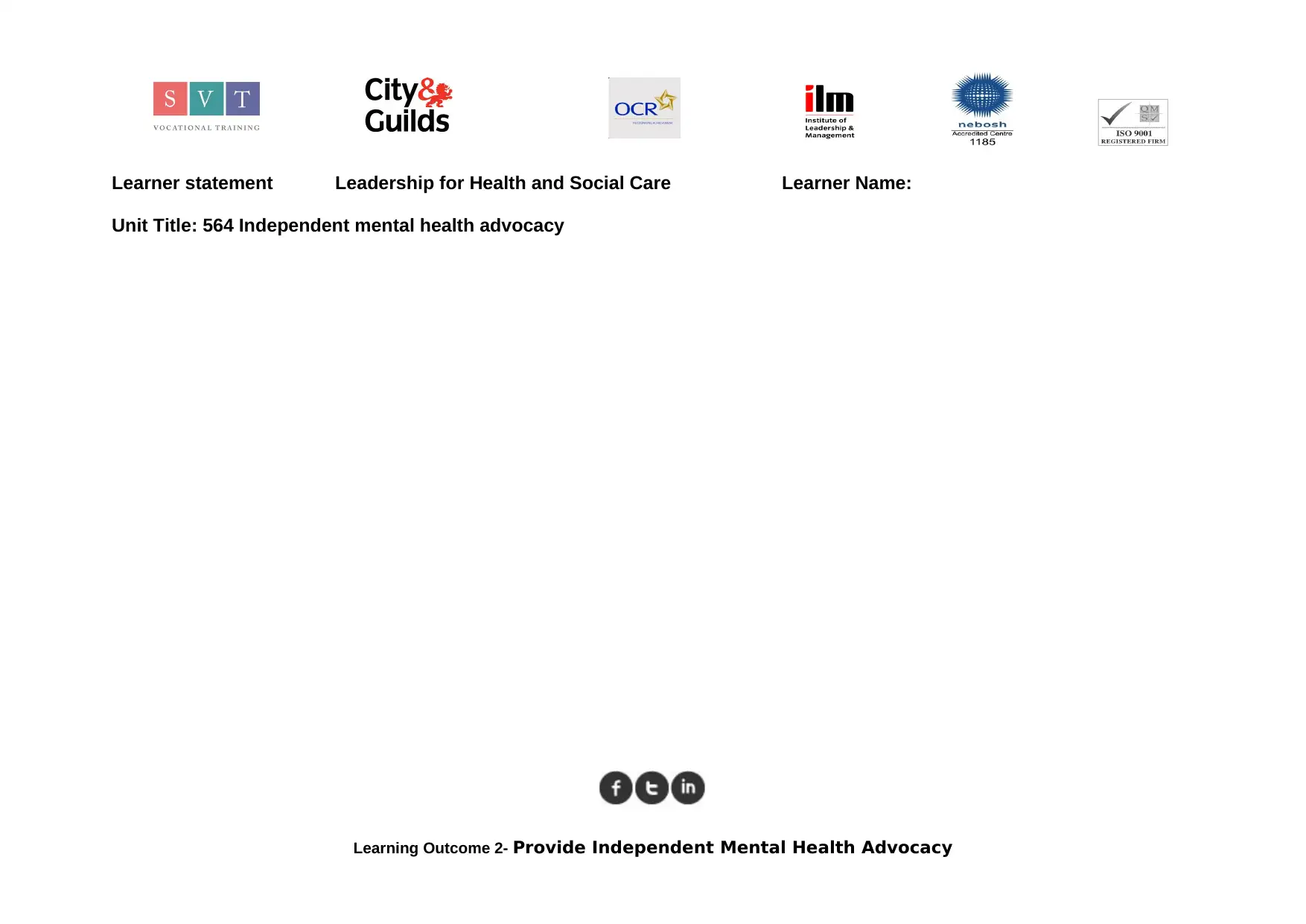
Learner statement Leadership for Health and Social Care Learner Name:
Unit Title: 564 Independent mental health advocacy
Learning Outcome 2- Provide Independent Mental Health Advocacy
Unit Title: 564 Independent mental health advocacy
Learning Outcome 2- Provide Independent Mental Health Advocacy
Paraphrase This Document
Need a fresh take? Get an instant paraphrase of this document with our AI Paraphraser
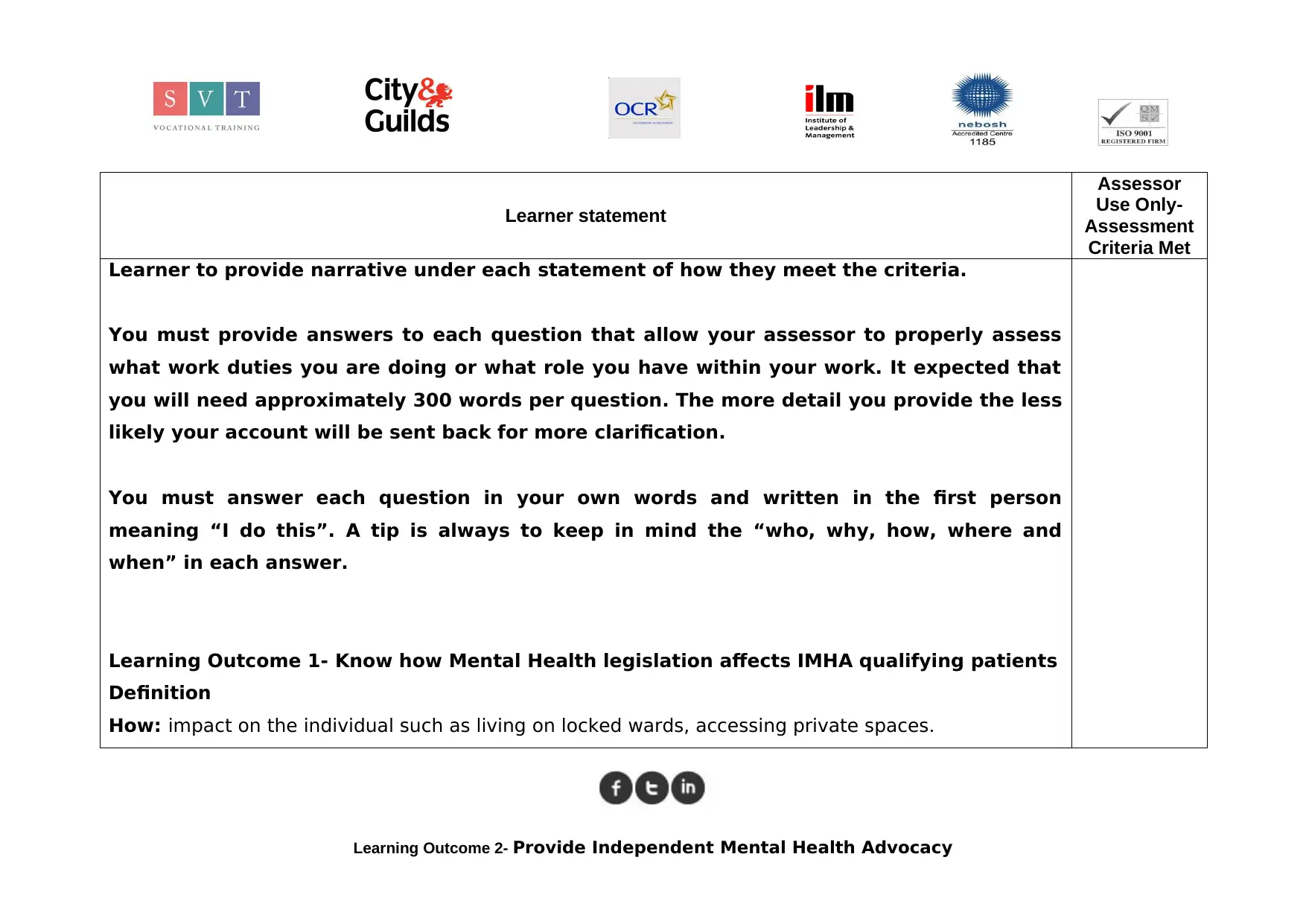
Learner statement
Assessor
Use Only-
Assessment
Criteria Met
Learner to provide narrative under each statement of how they meet the criteria.
You must provide answers to each question that allow your assessor to properly assess
what work duties you are doing or what role you have within your work. It expected that
you will need approximately 300 words per question. The more detail you provide the less
likely your account will be sent back for more clarification.
You must answer each question in your own words and written in the first person
meaning “I do this”. A tip is always to keep in mind the “who, why, how, where and
when” in each answer.
Learning Outcome 1- Know how Mental Health legislation affects IMHA qualifying patients
Definition
How: impact on the individual such as living on locked wards, accessing private spaces.
Learning Outcome 2- Provide Independent Mental Health Advocacy
Assessor
Use Only-
Assessment
Criteria Met
Learner to provide narrative under each statement of how they meet the criteria.
You must provide answers to each question that allow your assessor to properly assess
what work duties you are doing or what role you have within your work. It expected that
you will need approximately 300 words per question. The more detail you provide the less
likely your account will be sent back for more clarification.
You must answer each question in your own words and written in the first person
meaning “I do this”. A tip is always to keep in mind the “who, why, how, where and
when” in each answer.
Learning Outcome 1- Know how Mental Health legislation affects IMHA qualifying patients
Definition
How: impact on the individual such as living on locked wards, accessing private spaces.
Learning Outcome 2- Provide Independent Mental Health Advocacy
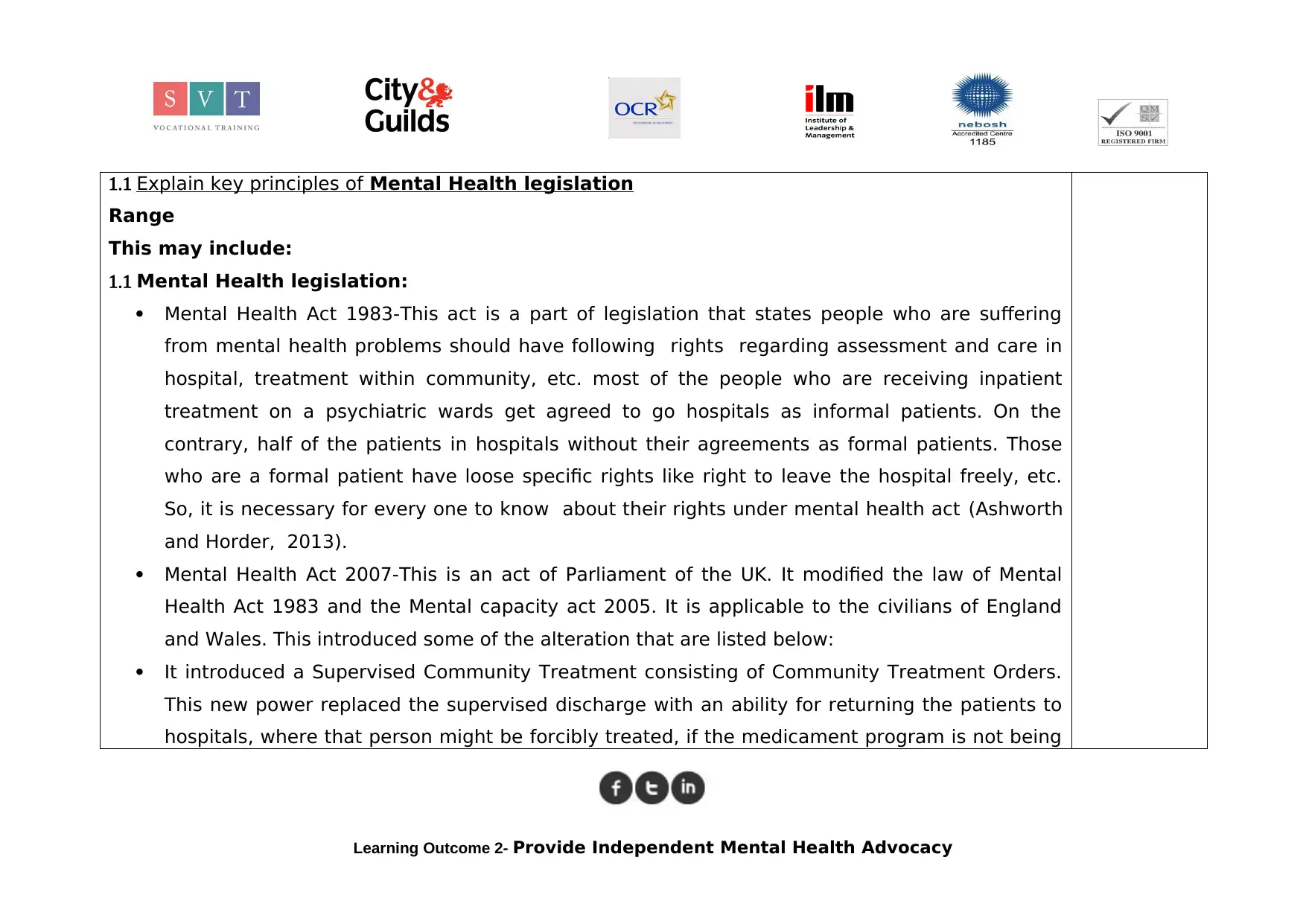
1.1 Explain key principles of Mental Health legislation
Range
This may include:
1.1 Mental Health legislation:
Mental Health Act 1983-This act is a part of legislation that states people who are suffering
from mental health problems should have following rights regarding assessment and care in
hospital, treatment within community, etc. most of the people who are receiving inpatient
treatment on a psychiatric wards get agreed to go hospitals as informal patients. On the
contrary, half of the patients in hospitals without their agreements as formal patients. Those
who are a formal patient have loose specific rights like right to leave the hospital freely, etc.
So, it is necessary for every one to know about their rights under mental health act (Ashworth
and Horder, 2013).
Mental Health Act 2007-This is an act of Parliament of the UK. It modified the law of Mental
Health Act 1983 and the Mental capacity act 2005. It is applicable to the civilians of England
and Wales. This introduced some of the alteration that are listed below:
It introduced a Supervised Community Treatment consisting of Community Treatment Orders.
This new power replaced the supervised discharge with an ability for returning the patients to
hospitals, where that person might be forcibly treated, if the medicament program is not being
Learning Outcome 2- Provide Independent Mental Health Advocacy
Range
This may include:
1.1 Mental Health legislation:
Mental Health Act 1983-This act is a part of legislation that states people who are suffering
from mental health problems should have following rights regarding assessment and care in
hospital, treatment within community, etc. most of the people who are receiving inpatient
treatment on a psychiatric wards get agreed to go hospitals as informal patients. On the
contrary, half of the patients in hospitals without their agreements as formal patients. Those
who are a formal patient have loose specific rights like right to leave the hospital freely, etc.
So, it is necessary for every one to know about their rights under mental health act (Ashworth
and Horder, 2013).
Mental Health Act 2007-This is an act of Parliament of the UK. It modified the law of Mental
Health Act 1983 and the Mental capacity act 2005. It is applicable to the civilians of England
and Wales. This introduced some of the alteration that are listed below:
It introduced a Supervised Community Treatment consisting of Community Treatment Orders.
This new power replaced the supervised discharge with an ability for returning the patients to
hospitals, where that person might be forcibly treated, if the medicament program is not being
Learning Outcome 2- Provide Independent Mental Health Advocacy
⊘ This is a preview!⊘
Do you want full access?
Subscribe today to unlock all pages.

Trusted by 1+ million students worldwide
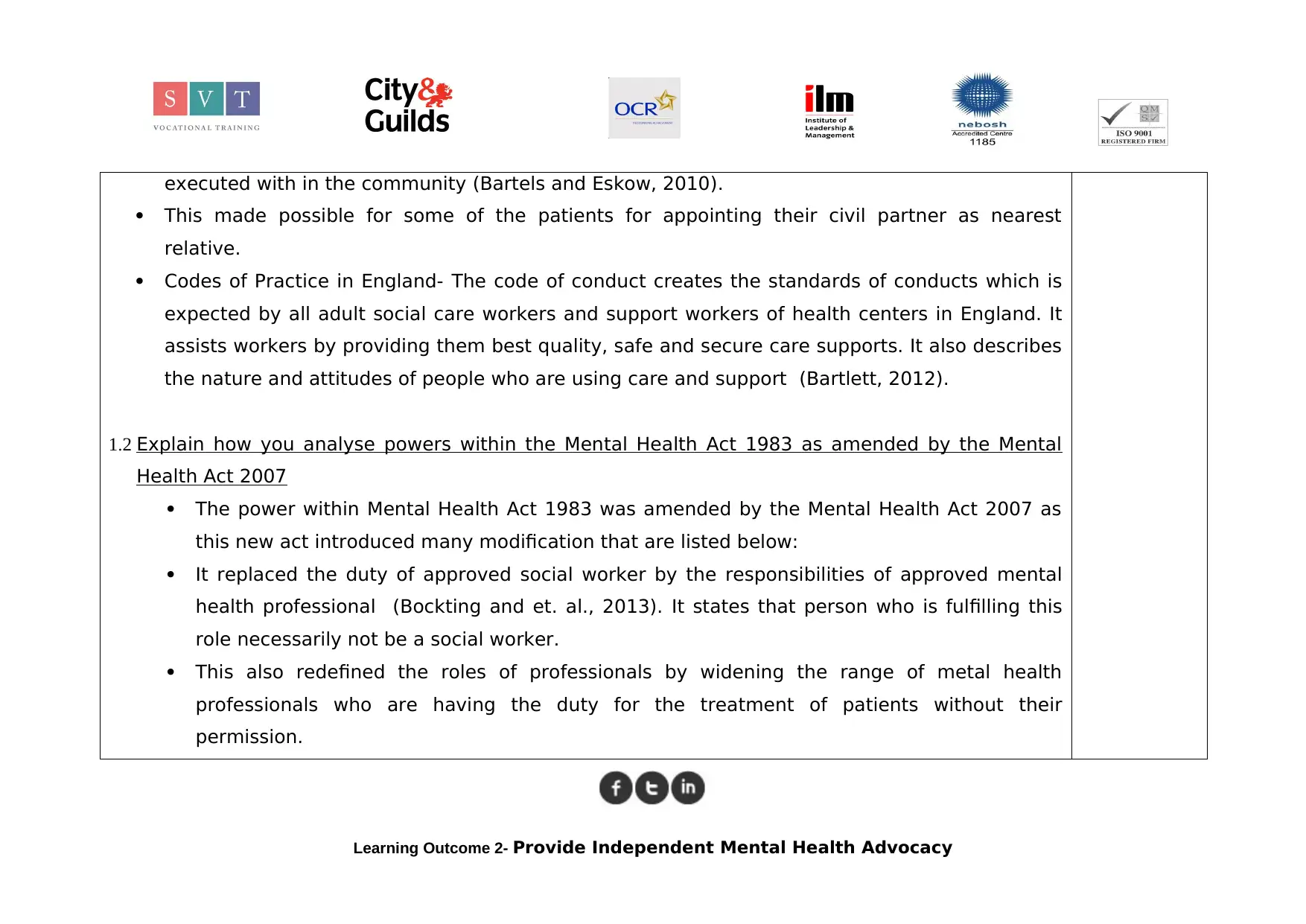
executed with in the community (Bartels and Eskow, 2010).
This made possible for some of the patients for appointing their civil partner as nearest
relative.
Codes of Practice in England- The code of conduct creates the standards of conducts which is
expected by all adult social care workers and support workers of health centers in England. It
assists workers by providing them best quality, safe and secure care supports. It also describes
the nature and attitudes of people who are using care and support (Bartlett, 2012).
1.2 Explain how you analyse powers within the Mental Health Act 1983 as amended by the Mental
Health Act 2007
The power within Mental Health Act 1983 was amended by the Mental Health Act 2007 as
this new act introduced many modification that are listed below:
It replaced the duty of approved social worker by the responsibilities of approved mental
health professional (Bockting and et. al., 2013). It states that person who is fulfilling this
role necessarily not be a social worker.
This also redefined the roles of professionals by widening the range of metal health
professionals who are having the duty for the treatment of patients without their
permission.
Learning Outcome 2- Provide Independent Mental Health Advocacy
This made possible for some of the patients for appointing their civil partner as nearest
relative.
Codes of Practice in England- The code of conduct creates the standards of conducts which is
expected by all adult social care workers and support workers of health centers in England. It
assists workers by providing them best quality, safe and secure care supports. It also describes
the nature and attitudes of people who are using care and support (Bartlett, 2012).
1.2 Explain how you analyse powers within the Mental Health Act 1983 as amended by the Mental
Health Act 2007
The power within Mental Health Act 1983 was amended by the Mental Health Act 2007 as
this new act introduced many modification that are listed below:
It replaced the duty of approved social worker by the responsibilities of approved mental
health professional (Bockting and et. al., 2013). It states that person who is fulfilling this
role necessarily not be a social worker.
This also redefined the roles of professionals by widening the range of metal health
professionals who are having the duty for the treatment of patients without their
permission.
Learning Outcome 2- Provide Independent Mental Health Advocacy
Paraphrase This Document
Need a fresh take? Get an instant paraphrase of this document with our AI Paraphraser
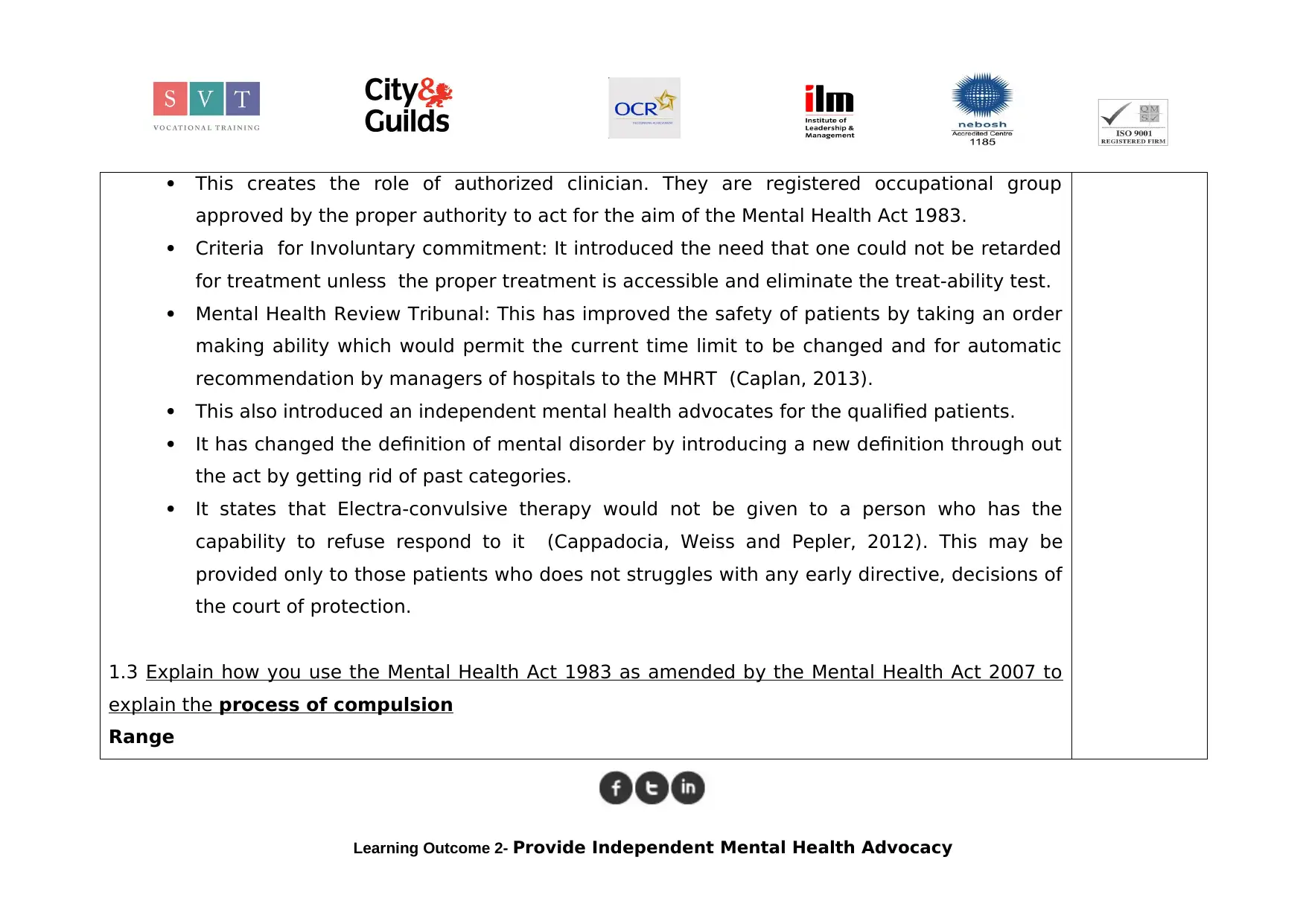
This creates the role of authorized clinician. They are registered occupational group
approved by the proper authority to act for the aim of the Mental Health Act 1983.
Criteria for Involuntary commitment: It introduced the need that one could not be retarded
for treatment unless the proper treatment is accessible and eliminate the treat-ability test.
Mental Health Review Tribunal: This has improved the safety of patients by taking an order
making ability which would permit the current time limit to be changed and for automatic
recommendation by managers of hospitals to the MHRT (Caplan, 2013).
This also introduced an independent mental health advocates for the qualified patients.
It has changed the definition of mental disorder by introducing a new definition through out
the act by getting rid of past categories.
It states that Electra-convulsive therapy would not be given to a person who has the
capability to refuse respond to it (Cappadocia, Weiss and Pepler, 2012). This may be
provided only to those patients who does not struggles with any early directive, decisions of
the court of protection.
1.3 Explain how you use the Mental Health Act 1983 as amended by the Mental Health Act 2007 to
explain the process of compulsion
Range
Learning Outcome 2- Provide Independent Mental Health Advocacy
approved by the proper authority to act for the aim of the Mental Health Act 1983.
Criteria for Involuntary commitment: It introduced the need that one could not be retarded
for treatment unless the proper treatment is accessible and eliminate the treat-ability test.
Mental Health Review Tribunal: This has improved the safety of patients by taking an order
making ability which would permit the current time limit to be changed and for automatic
recommendation by managers of hospitals to the MHRT (Caplan, 2013).
This also introduced an independent mental health advocates for the qualified patients.
It has changed the definition of mental disorder by introducing a new definition through out
the act by getting rid of past categories.
It states that Electra-convulsive therapy would not be given to a person who has the
capability to refuse respond to it (Cappadocia, Weiss and Pepler, 2012). This may be
provided only to those patients who does not struggles with any early directive, decisions of
the court of protection.
1.3 Explain how you use the Mental Health Act 1983 as amended by the Mental Health Act 2007 to
explain the process of compulsion
Range
Learning Outcome 2- Provide Independent Mental Health Advocacy
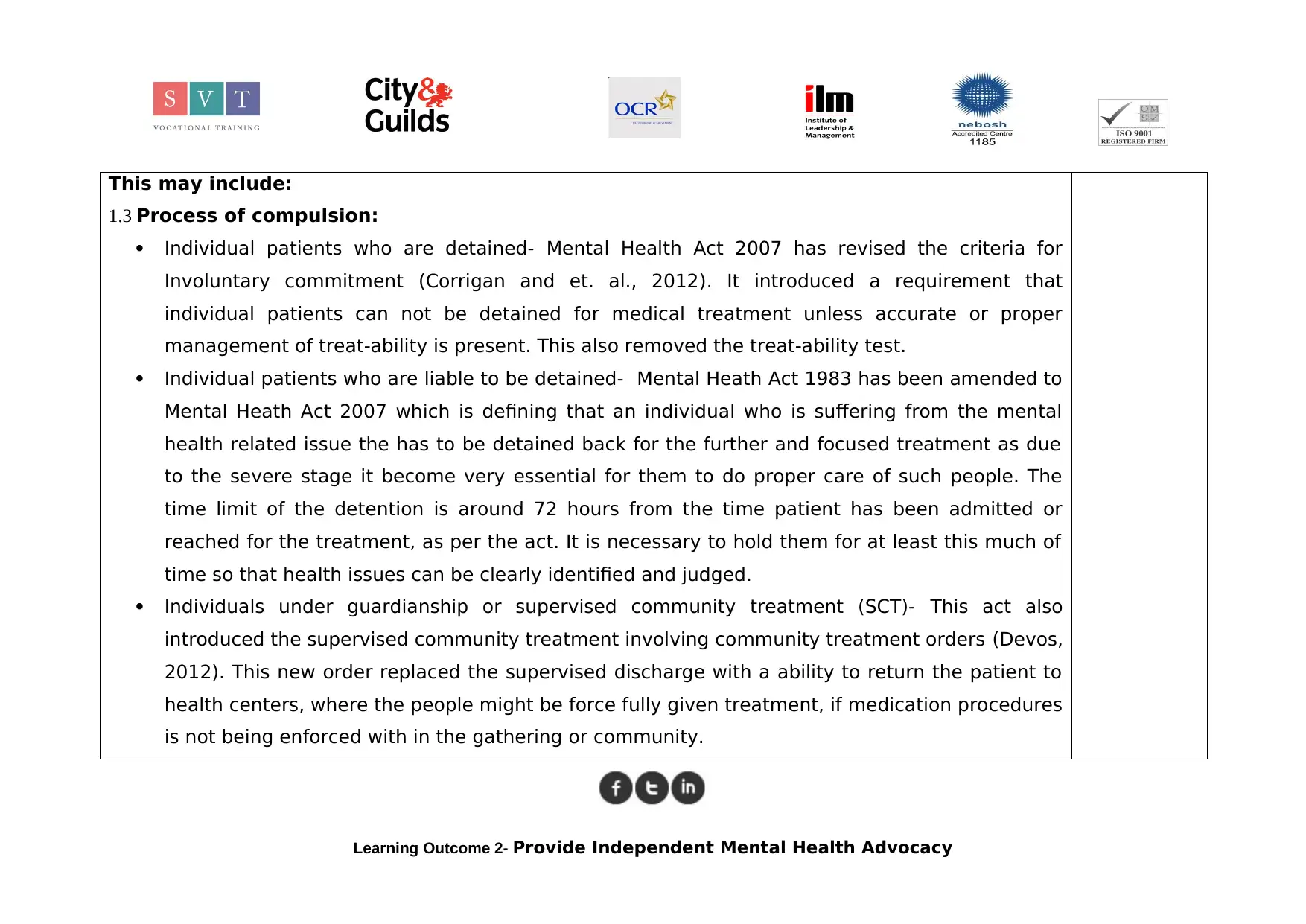
This may include:
1.3 Process of compulsion:
Individual patients who are detained- Mental Health Act 2007 has revised the criteria for
Involuntary commitment (Corrigan and et. al., 2012). It introduced a requirement that
individual patients can not be detained for medical treatment unless accurate or proper
management of treat-ability is present. This also removed the treat-ability test.
Individual patients who are liable to be detained- Mental Heath Act 1983 has been amended to
Mental Heath Act 2007 which is defining that an individual who is suffering from the mental
health related issue the has to be detained back for the further and focused treatment as due
to the severe stage it become very essential for them to do proper care of such people. The
time limit of the detention is around 72 hours from the time patient has been admitted or
reached for the treatment, as per the act. It is necessary to hold them for at least this much of
time so that health issues can be clearly identified and judged.
Individuals under guardianship or supervised community treatment (SCT)- This act also
introduced the supervised community treatment involving community treatment orders (Devos,
2012). This new order replaced the supervised discharge with a ability to return the patient to
health centers, where the people might be force fully given treatment, if medication procedures
is not being enforced with in the gathering or community.
Learning Outcome 2- Provide Independent Mental Health Advocacy
1.3 Process of compulsion:
Individual patients who are detained- Mental Health Act 2007 has revised the criteria for
Involuntary commitment (Corrigan and et. al., 2012). It introduced a requirement that
individual patients can not be detained for medical treatment unless accurate or proper
management of treat-ability is present. This also removed the treat-ability test.
Individual patients who are liable to be detained- Mental Heath Act 1983 has been amended to
Mental Heath Act 2007 which is defining that an individual who is suffering from the mental
health related issue the has to be detained back for the further and focused treatment as due
to the severe stage it become very essential for them to do proper care of such people. The
time limit of the detention is around 72 hours from the time patient has been admitted or
reached for the treatment, as per the act. It is necessary to hold them for at least this much of
time so that health issues can be clearly identified and judged.
Individuals under guardianship or supervised community treatment (SCT)- This act also
introduced the supervised community treatment involving community treatment orders (Devos,
2012). This new order replaced the supervised discharge with a ability to return the patient to
health centers, where the people might be force fully given treatment, if medication procedures
is not being enforced with in the gathering or community.
Learning Outcome 2- Provide Independent Mental Health Advocacy
⊘ This is a preview!⊘
Do you want full access?
Subscribe today to unlock all pages.

Trusted by 1+ million students worldwide
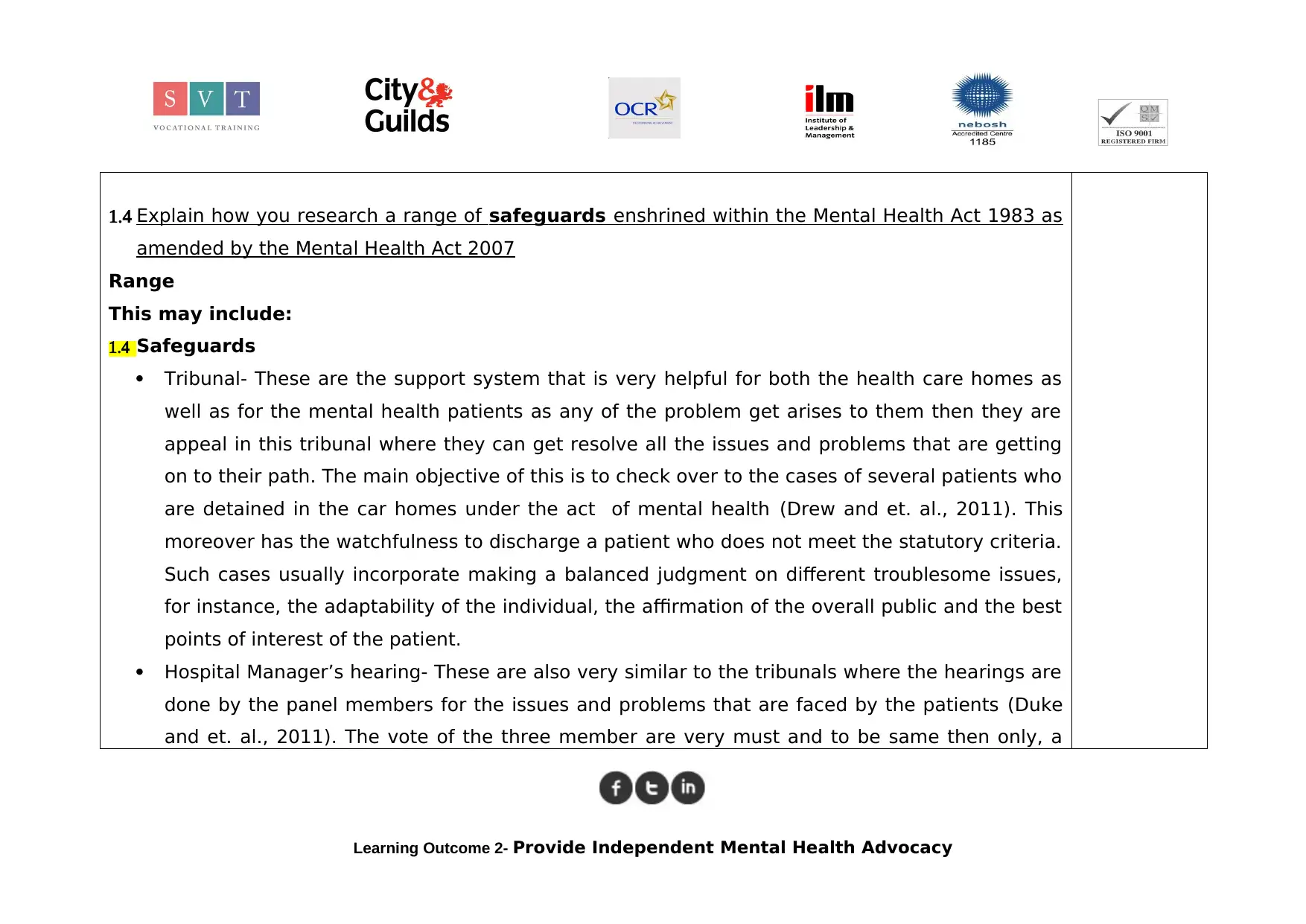
1.4 Explain how you research a range of safeguards enshrined within the Mental Health Act 1983 as
amended by the Mental Health Act 2007
Range
This may include:
1.4 Safeguards
Tribunal- These are the support system that is very helpful for both the health care homes as
well as for the mental health patients as any of the problem get arises to them then they are
appeal in this tribunal where they can get resolve all the issues and problems that are getting
on to their path. The main objective of this is to check over to the cases of several patients who
are detained in the car homes under the act of mental health (Drew and et. al., 2011). This
moreover has the watchfulness to discharge a patient who does not meet the statutory criteria.
Such cases usually incorporate making a balanced judgment on different troublesome issues,
for instance, the adaptability of the individual, the affirmation of the overall public and the best
points of interest of the patient.
Hospital Manager’s hearing- These are also very similar to the tribunals where the hearings are
done by the panel members for the issues and problems that are faced by the patients (Duke
and et. al., 2011). The vote of the three member are very must and to be same then only, a
Learning Outcome 2- Provide Independent Mental Health Advocacy
amended by the Mental Health Act 2007
Range
This may include:
1.4 Safeguards
Tribunal- These are the support system that is very helpful for both the health care homes as
well as for the mental health patients as any of the problem get arises to them then they are
appeal in this tribunal where they can get resolve all the issues and problems that are getting
on to their path. The main objective of this is to check over to the cases of several patients who
are detained in the car homes under the act of mental health (Drew and et. al., 2011). This
moreover has the watchfulness to discharge a patient who does not meet the statutory criteria.
Such cases usually incorporate making a balanced judgment on different troublesome issues,
for instance, the adaptability of the individual, the affirmation of the overall public and the best
points of interest of the patient.
Hospital Manager’s hearing- These are also very similar to the tribunals where the hearings are
done by the panel members for the issues and problems that are faced by the patients (Duke
and et. al., 2011). The vote of the three member are very must and to be same then only, a
Learning Outcome 2- Provide Independent Mental Health Advocacy
Paraphrase This Document
Need a fresh take? Get an instant paraphrase of this document with our AI Paraphraser
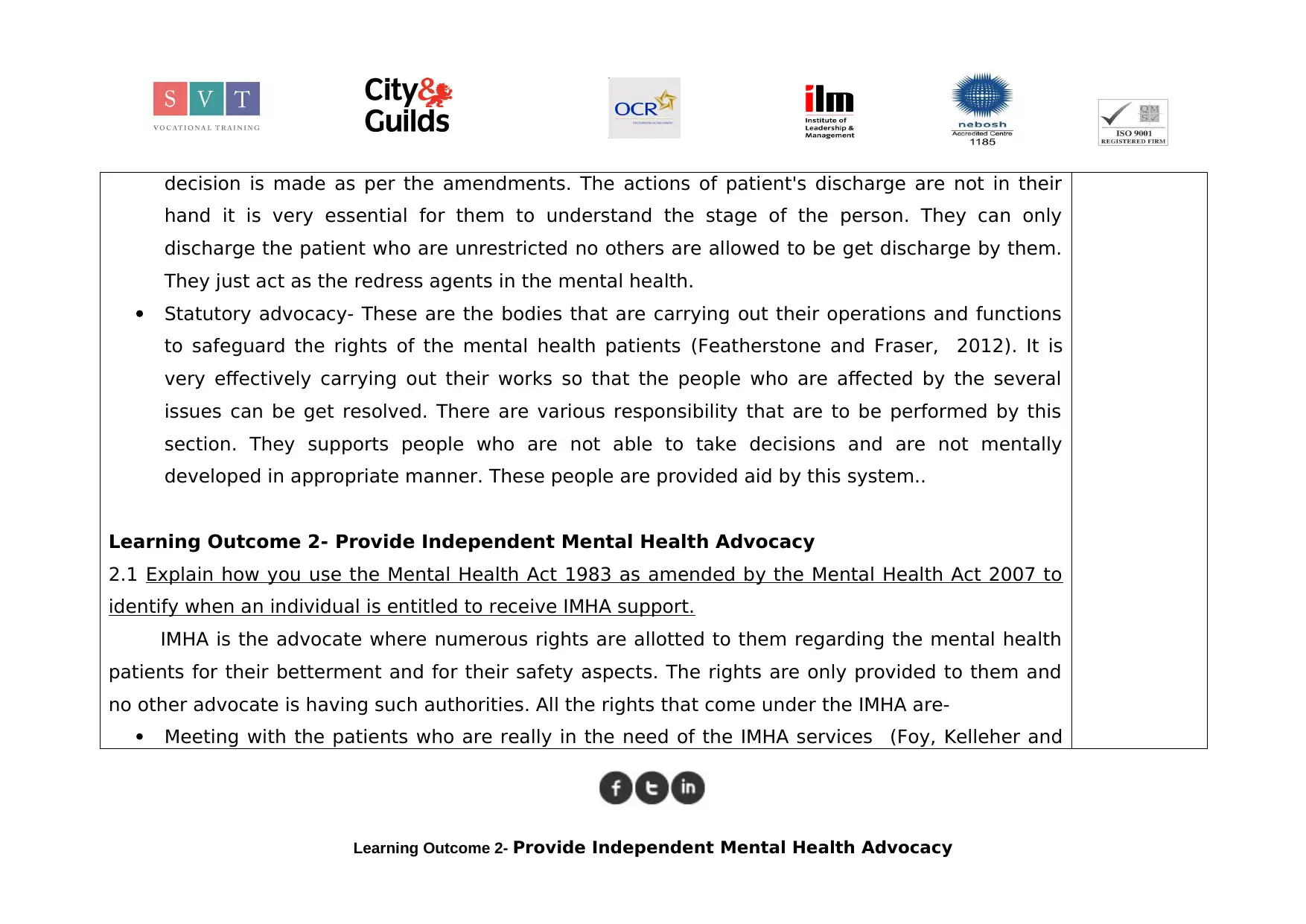
decision is made as per the amendments. The actions of patient's discharge are not in their
hand it is very essential for them to understand the stage of the person. They can only
discharge the patient who are unrestricted no others are allowed to be get discharge by them.
They just act as the redress agents in the mental health.
Statutory advocacy- These are the bodies that are carrying out their operations and functions
to safeguard the rights of the mental health patients (Featherstone and Fraser, 2012). It is
very effectively carrying out their works so that the people who are affected by the several
issues can be get resolved. There are various responsibility that are to be performed by this
section. They supports people who are not able to take decisions and are not mentally
developed in appropriate manner. These people are provided aid by this system..
Learning Outcome 2- Provide Independent Mental Health Advocacy
2.1 Explain how you use the Mental Health Act 1983 as amended by the Mental Health Act 2007 to
identify when an individual is entitled to receive IMHA support.
IMHA is the advocate where numerous rights are allotted to them regarding the mental health
patients for their betterment and for their safety aspects. The rights are only provided to them and
no other advocate is having such authorities. All the rights that come under the IMHA are-
Meeting with the patients who are really in the need of the IMHA services (Foy, Kelleher and
Learning Outcome 2- Provide Independent Mental Health Advocacy
hand it is very essential for them to understand the stage of the person. They can only
discharge the patient who are unrestricted no others are allowed to be get discharge by them.
They just act as the redress agents in the mental health.
Statutory advocacy- These are the bodies that are carrying out their operations and functions
to safeguard the rights of the mental health patients (Featherstone and Fraser, 2012). It is
very effectively carrying out their works so that the people who are affected by the several
issues can be get resolved. There are various responsibility that are to be performed by this
section. They supports people who are not able to take decisions and are not mentally
developed in appropriate manner. These people are provided aid by this system..
Learning Outcome 2- Provide Independent Mental Health Advocacy
2.1 Explain how you use the Mental Health Act 1983 as amended by the Mental Health Act 2007 to
identify when an individual is entitled to receive IMHA support.
IMHA is the advocate where numerous rights are allotted to them regarding the mental health
patients for their betterment and for their safety aspects. The rights are only provided to them and
no other advocate is having such authorities. All the rights that come under the IMHA are-
Meeting with the patients who are really in the need of the IMHA services (Foy, Kelleher and
Learning Outcome 2- Provide Independent Mental Health Advocacy
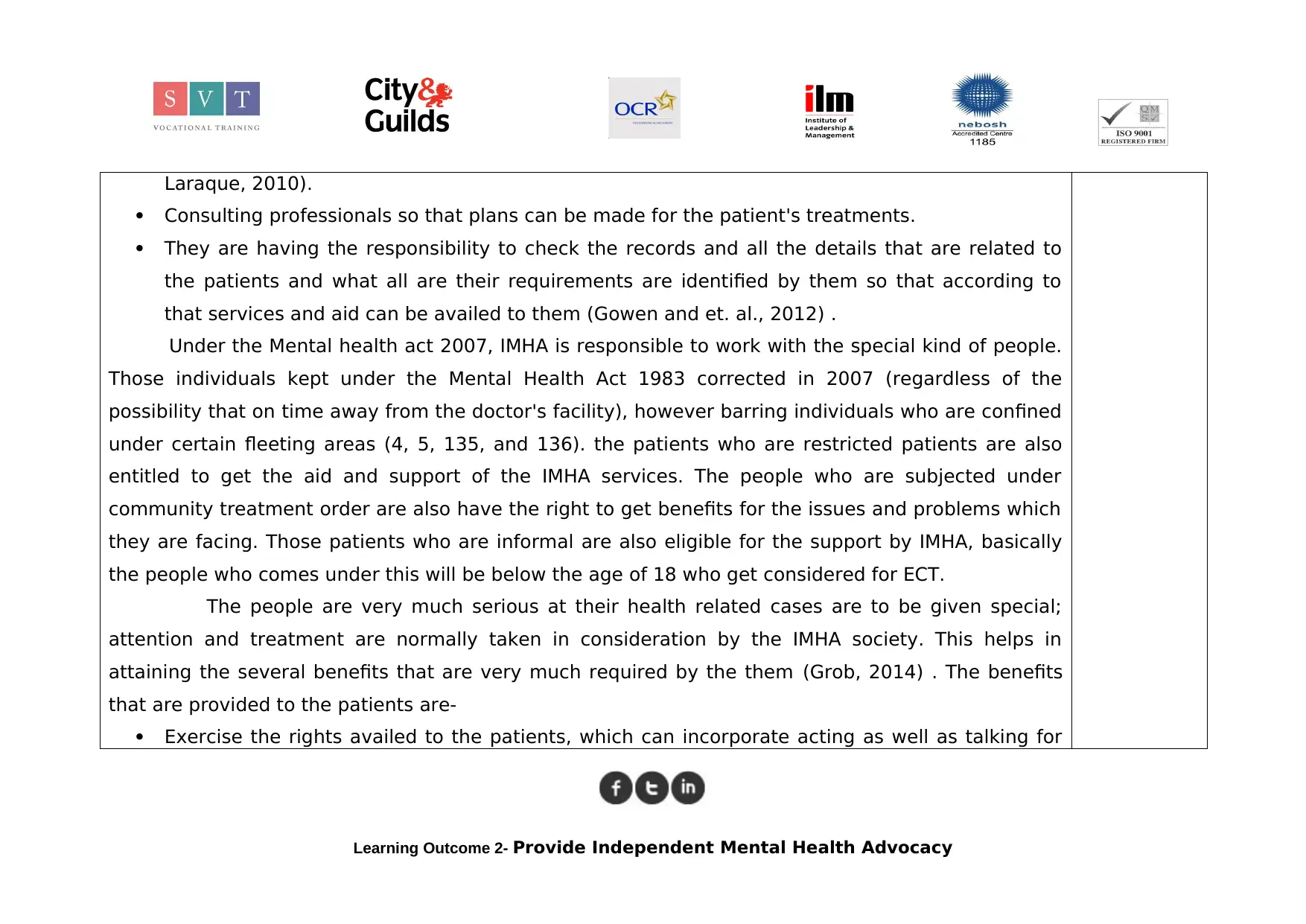
Laraque, 2010).
Consulting professionals so that plans can be made for the patient's treatments.
They are having the responsibility to check the records and all the details that are related to
the patients and what all are their requirements are identified by them so that according to
that services and aid can be availed to them (Gowen and et. al., 2012) .
Under the Mental health act 2007, IMHA is responsible to work with the special kind of people.
Those individuals kept under the Mental Health Act 1983 corrected in 2007 (regardless of the
possibility that on time away from the doctor's facility), however barring individuals who are confined
under certain fleeting areas (4, 5, 135, and 136). the patients who are restricted patients are also
entitled to get the aid and support of the IMHA services. The people who are subjected under
community treatment order are also have the right to get benefits for the issues and problems which
they are facing. Those patients who are informal are also eligible for the support by IMHA, basically
the people who comes under this will be below the age of 18 who get considered for ECT.
The people are very much serious at their health related cases are to be given special;
attention and treatment are normally taken in consideration by the IMHA society. This helps in
attaining the several benefits that are very much required by the them (Grob, 2014) . The benefits
that are provided to the patients are-
Exercise the rights availed to the patients, which can incorporate acting as well as talking for
Learning Outcome 2- Provide Independent Mental Health Advocacy
Consulting professionals so that plans can be made for the patient's treatments.
They are having the responsibility to check the records and all the details that are related to
the patients and what all are their requirements are identified by them so that according to
that services and aid can be availed to them (Gowen and et. al., 2012) .
Under the Mental health act 2007, IMHA is responsible to work with the special kind of people.
Those individuals kept under the Mental Health Act 1983 corrected in 2007 (regardless of the
possibility that on time away from the doctor's facility), however barring individuals who are confined
under certain fleeting areas (4, 5, 135, and 136). the patients who are restricted patients are also
entitled to get the aid and support of the IMHA services. The people who are subjected under
community treatment order are also have the right to get benefits for the issues and problems which
they are facing. Those patients who are informal are also eligible for the support by IMHA, basically
the people who comes under this will be below the age of 18 who get considered for ECT.
The people are very much serious at their health related cases are to be given special;
attention and treatment are normally taken in consideration by the IMHA society. This helps in
attaining the several benefits that are very much required by the them (Grob, 2014) . The benefits
that are provided to the patients are-
Exercise the rights availed to the patients, which can incorporate acting as well as talking for
Learning Outcome 2- Provide Independent Mental Health Advocacy
⊘ This is a preview!⊘
Do you want full access?
Subscribe today to unlock all pages.

Trusted by 1+ million students worldwide
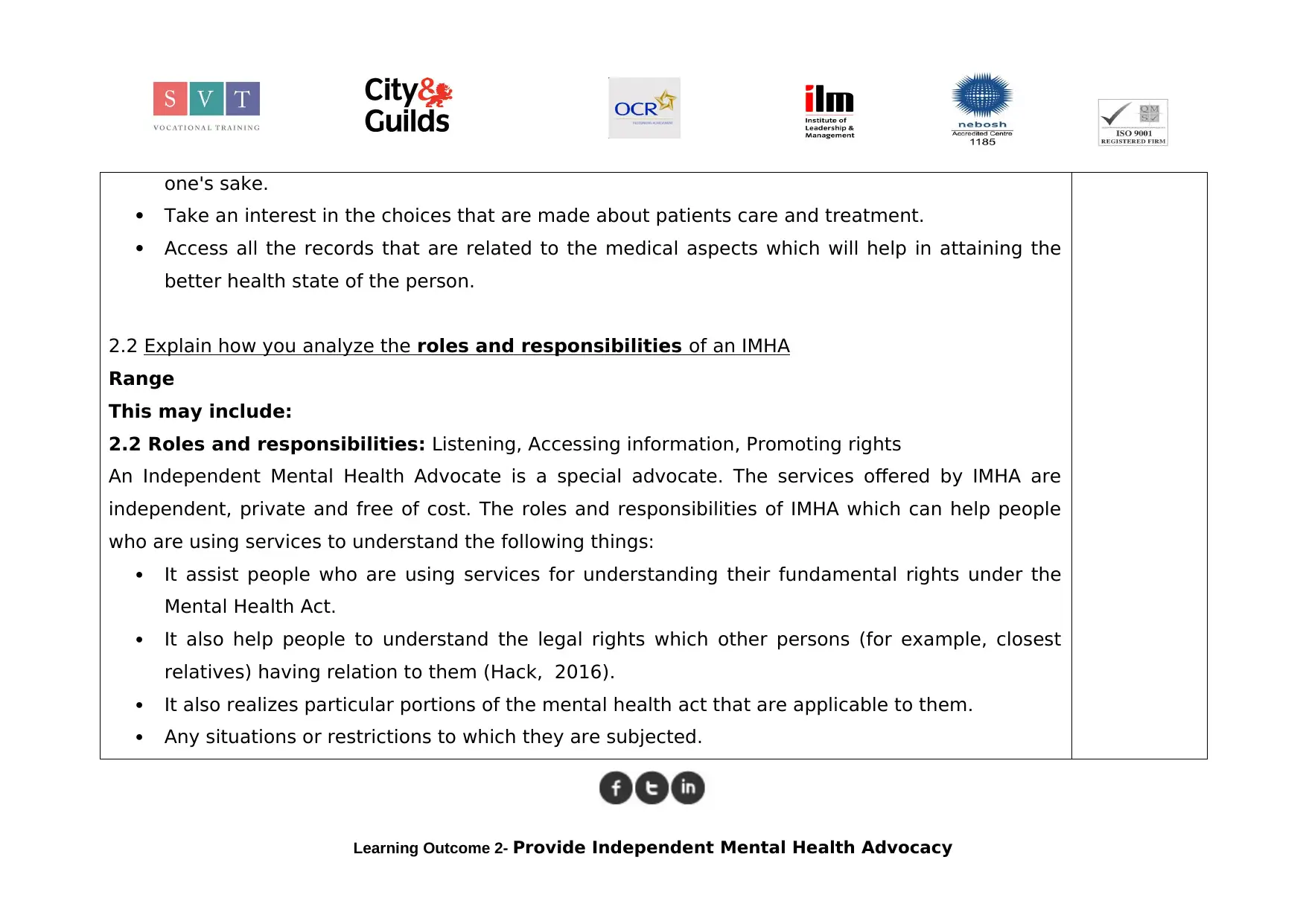
one's sake.
Take an interest in the choices that are made about patients care and treatment.
Access all the records that are related to the medical aspects which will help in attaining the
better health state of the person.
2.2 Explain how you analyze the roles and responsibilities of an IMHA
Range
This may include:
2.2 Roles and responsibilities: Listening, Accessing information, Promoting rights
An Independent Mental Health Advocate is a special advocate. The services offered by IMHA are
independent, private and free of cost. The roles and responsibilities of IMHA which can help people
who are using services to understand the following things:
It assist people who are using services for understanding their fundamental rights under the
Mental Health Act.
It also help people to understand the legal rights which other persons (for example, closest
relatives) having relation to them (Hack, 2016).
It also realizes particular portions of the mental health act that are applicable to them.
Any situations or restrictions to which they are subjected.
Learning Outcome 2- Provide Independent Mental Health Advocacy
Take an interest in the choices that are made about patients care and treatment.
Access all the records that are related to the medical aspects which will help in attaining the
better health state of the person.
2.2 Explain how you analyze the roles and responsibilities of an IMHA
Range
This may include:
2.2 Roles and responsibilities: Listening, Accessing information, Promoting rights
An Independent Mental Health Advocate is a special advocate. The services offered by IMHA are
independent, private and free of cost. The roles and responsibilities of IMHA which can help people
who are using services to understand the following things:
It assist people who are using services for understanding their fundamental rights under the
Mental Health Act.
It also help people to understand the legal rights which other persons (for example, closest
relatives) having relation to them (Hack, 2016).
It also realizes particular portions of the mental health act that are applicable to them.
Any situations or restrictions to which they are subjected.
Learning Outcome 2- Provide Independent Mental Health Advocacy
Paraphrase This Document
Need a fresh take? Get an instant paraphrase of this document with our AI Paraphraser
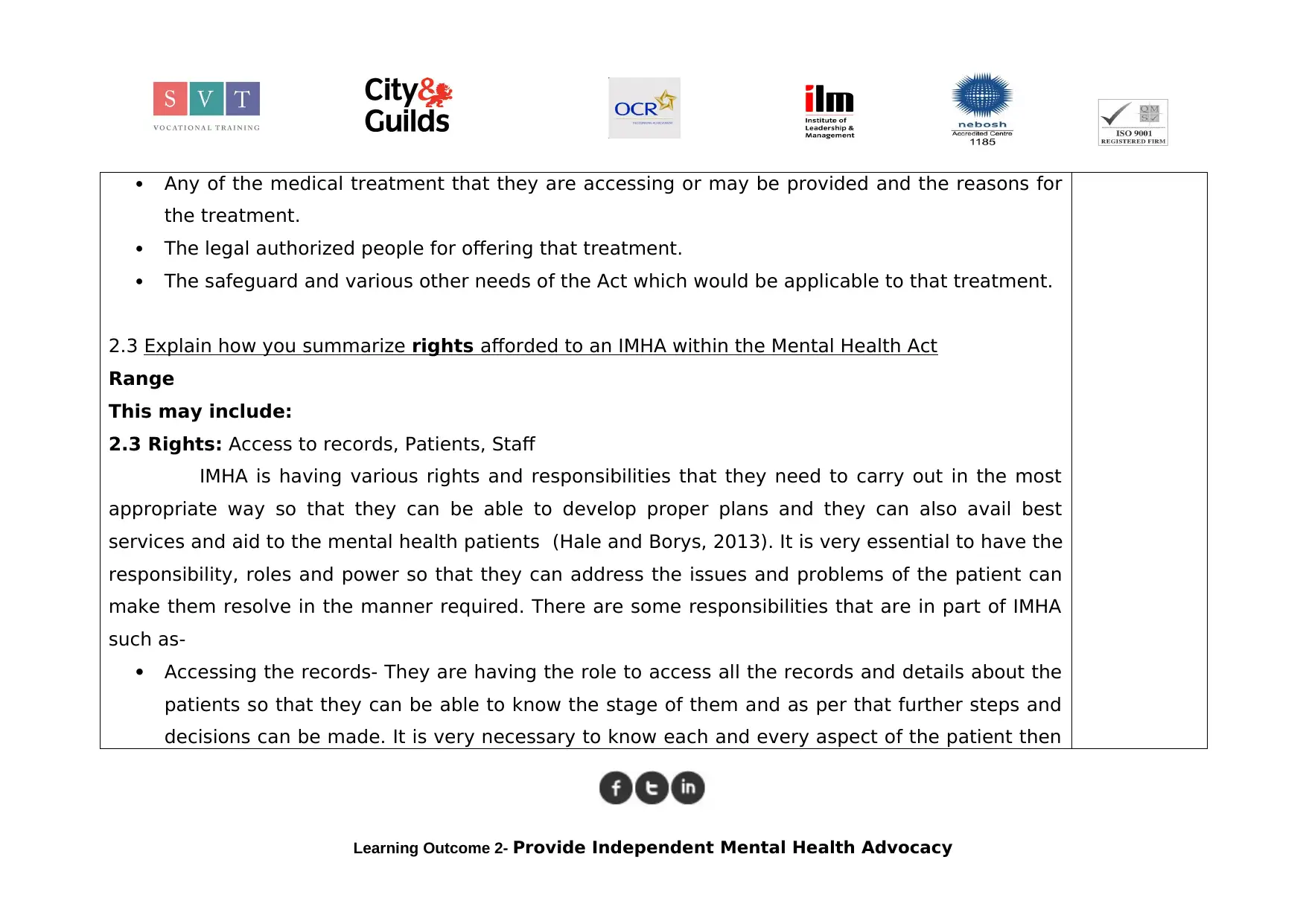
Any of the medical treatment that they are accessing or may be provided and the reasons for
the treatment.
The legal authorized people for offering that treatment.
The safeguard and various other needs of the Act which would be applicable to that treatment.
2.3 Explain how you summarize rights afforded to an IMHA within the Mental Health Act
Range
This may include:
2.3 Rights: Access to records, Patients, Staff
IMHA is having various rights and responsibilities that they need to carry out in the most
appropriate way so that they can be able to develop proper plans and they can also avail best
services and aid to the mental health patients (Hale and Borys, 2013). It is very essential to have the
responsibility, roles and power so that they can address the issues and problems of the patient can
make them resolve in the manner required. There are some responsibilities that are in part of IMHA
such as-
Accessing the records- They are having the role to access all the records and details about the
patients so that they can be able to know the stage of them and as per that further steps and
decisions can be made. It is very necessary to know each and every aspect of the patient then
Learning Outcome 2- Provide Independent Mental Health Advocacy
the treatment.
The legal authorized people for offering that treatment.
The safeguard and various other needs of the Act which would be applicable to that treatment.
2.3 Explain how you summarize rights afforded to an IMHA within the Mental Health Act
Range
This may include:
2.3 Rights: Access to records, Patients, Staff
IMHA is having various rights and responsibilities that they need to carry out in the most
appropriate way so that they can be able to develop proper plans and they can also avail best
services and aid to the mental health patients (Hale and Borys, 2013). It is very essential to have the
responsibility, roles and power so that they can address the issues and problems of the patient can
make them resolve in the manner required. There are some responsibilities that are in part of IMHA
such as-
Accessing the records- They are having the role to access all the records and details about the
patients so that they can be able to know the stage of them and as per that further steps and
decisions can be made. It is very necessary to know each and every aspect of the patient then
Learning Outcome 2- Provide Independent Mental Health Advocacy

only they will firstly able to know whether the person is actually eligible for using the support
system of the IMHA or not. After getting confirmation about the patient then, they can also be
able to provide the services to their needs and the stage. They plays a very vital role in the
accessing of the records about all the people.
Patients- For the welfare and proper care of the patients IMHA is contributing very effectively
and in a very appropriate manner. There are various treatments that are for the people, the
best suitable is availed to them. This duty totally relies upon the independent mental health
advocacy. What all services are must and has to be provided are also decided by them only
(Hatcher, Oyer and Gallardo, 2011).
Staff- This will help the people to have the right where they can be able to raise the question
about the services and treatment that they are getting from the health care homes. They can
get the proper plans for the care that is been provided to patients. This will also assist the
staffs and employees to attend the several meeting that are related to the services and care
plans along with that they can also be able to get preparation for the wards round as well.
2.4 Explain how you priorities a range of case work
In a health care home it is very necessary for me to take in consideration about the aspect that
are related to the different illness. It has become very necessary to set priorities for each task so that
Learning Outcome 2- Provide Independent Mental Health Advocacy
system of the IMHA or not. After getting confirmation about the patient then, they can also be
able to provide the services to their needs and the stage. They plays a very vital role in the
accessing of the records about all the people.
Patients- For the welfare and proper care of the patients IMHA is contributing very effectively
and in a very appropriate manner. There are various treatments that are for the people, the
best suitable is availed to them. This duty totally relies upon the independent mental health
advocacy. What all services are must and has to be provided are also decided by them only
(Hatcher, Oyer and Gallardo, 2011).
Staff- This will help the people to have the right where they can be able to raise the question
about the services and treatment that they are getting from the health care homes. They can
get the proper plans for the care that is been provided to patients. This will also assist the
staffs and employees to attend the several meeting that are related to the services and care
plans along with that they can also be able to get preparation for the wards round as well.
2.4 Explain how you priorities a range of case work
In a health care home it is very necessary for me to take in consideration about the aspect that
are related to the different illness. It has become very necessary to set priorities for each task so that
Learning Outcome 2- Provide Independent Mental Health Advocacy
⊘ This is a preview!⊘
Do you want full access?
Subscribe today to unlock all pages.

Trusted by 1+ million students worldwide
1 out of 53
Related Documents
Your All-in-One AI-Powered Toolkit for Academic Success.
+13062052269
info@desklib.com
Available 24*7 on WhatsApp / Email
![[object Object]](/_next/static/media/star-bottom.7253800d.svg)
Unlock your academic potential
Copyright © 2020–2026 A2Z Services. All Rights Reserved. Developed and managed by ZUCOL.





